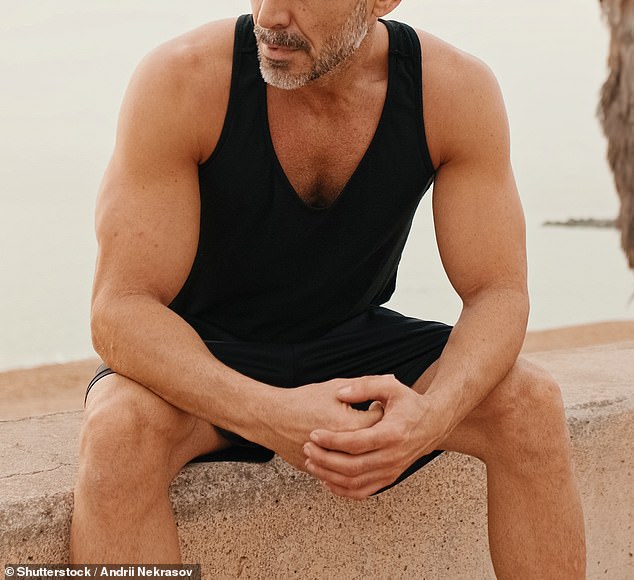
For decades, the tools of male anti-ageing were predictable.
A discreet prescription for the little blue pill, a secret stash of human growth hormone (HGH), maybe even a home gym that mostly gathered dust.
But a new player has entered the chat – and according to whispers echoing off the walls of gyms, cafés and clinics in Sydney’s eastern suburbs, it is already being called the secret weapon of middle-aged ‘alphas’.

‘I felt like I needed something more than just rest,’ Dave* tells DailyMail+ (stock photo)
Peptides – tiny chains of amino acids that act as messengers in the body – are being hailed as a low-cost, high-reward way to boost recovery, build muscle and help men in their forties, fifties and sixties feel sharper, stronger – and yes, sexier.
Once the territory of bodybuilders and biohackers, peptide therapy is now going mainstream.
It is becoming especially popular among middle-aged men quietly battling fading energy, sore joints and that nagging sense the ‘young bucks’ at the gym are bouncing back faster than they are.
‘I first heard about peptides a few years ago but wasn’t really interested,’ Dave*, a 40-year-old father of four and Brazilian jiu-jitsu black belt tells me.
‘But once I turned 40, I had a lot of injuries that just weren’t going away. I felt like I needed something more than just rest.’
It was only after speaking with other men in the fitness industry – peers around his age who’d quietly started supplementing with peptides – that Dave decided to try BPC-157 and TB-500, under the guidance of his doctor.
‘Within two weeks, I noticed significant results. Injuries like golfer’s elbow completely disappeared. I wasn’t as sore the next day after training. I started weight training again and could keep up with the younger guys at the gym.’

Dr Rula Ali says social media and influencers are helping to normalise the use of peptides
For Dave, the results were life-changing.
‘The benefits totally outweigh the cost for me – my tools are my body, and they were finally working great again. I haven’t seen any negative effects at all.’
He’s not alone.
Mike*, a 47-year-old jiu-jitsu blue belt, hasn’t yet taken the plunge but says the appeal is obvious.
‘I love training high intensity and it’s getting more and more difficult to recover. I just don’t have the strength and bounce back that I used to – especially when I’m rolling with the young bucks.’
Even men with no interest in grappling sports are getting curious.
Steve*, a 49-year-old property developer from Vaucluse, describes his decision to try peptides as less about performance and more about preservation.
‘I’ve always looked after myself – gym a few times a week, no crazy vices. But lately I’d catch my reflection and think, “Mate, you look tired.” I wasn’t sleeping well, work was full-on, and I felt like my body was giving up before my mind was ready to,’ he tells me.
‘Someone at my office mentioned peptides – he was looking ridiculously fresh for someone with teenage kids. I saw my doctor, started on BPC-157, and now I feel like I’ve got my edge back. I’m not trying to look 25 – I just want to feel like myself again.’
But what are peptides – and do they actually work?
‘In simple terms, peptides are short chains of amino acids,’ explains Dr Rula Ali, NSW & ACT Deputy Chair of the Royal Australian College of General Practitioners.
‘They are like little messengers in the body to help regulate different functions, like hormone signalling or immune response.’
Some peptides, like insulin or growth hormone, have well-established roles in medicine. Others, like BPC-157 and TB-500, are used off-label in the fitness and recovery world, often via compounding pharmacies or under medical supervision.
‘There are many possible reasons why men are using them more,’ Dr Ali says.
‘Social media and influencers might have helped normalise their use. Also, some men are becoming more concerned, aware and proactive about ageing, wanting to maintain their energy and youthful appearance and vitality.’
But she warns that while some peptides are backed by research, others are not.
‘Peptides used by healthy men for fitness reasons could cause many side effects like hormonal imbalance, joint stiffness, hunger, tiredness, numbness, sugar level imbalance and more.’
Her advice? ‘Before using any non-prescribed peptide for the use of anti-ageing or increased energy and fitness levels, it is always best to consult with your usual GP.’
The billionaire who made peptides go viral
If you’ve heard of peptides before, it’s likely thanks to Bryan Johnson – the 46-year-old American tech entrepreneur spending millions a year to try and reverse his biological age.
Johnson’s rigorous daily routine includes calorie restriction, laser therapy, organ scans, regular blood tests – and yes, peptides.
Among the peptide protocols he has publicly acknowledged using are BPC-157, commonly associated with tissue repair and injury recovery, and Cerebrolysin, a neuropeptide compound linked to cognitive performance.
While Johnson is enthusiastic about the potential of these compounds, he’s also been clear that research in this space is still emerging. He acknowledges many peptide treatments are experimental, and that more scientific evidence is needed to determine their long-term effectiveness and safety.
Still, that hasn’t stopped him – or a growing number of men – from exploring their potential.
Like cryotherapy and cold plunges before them, peptides have now crossed over from niche to nearly mainstream.

A growing number of men are exploring the use of peptides, which are injected using a syringe, for anti-ageing (stock photo)
So are peptides the future of ageing well?
Dr Ali urges men not to overlook the basics.
‘The best way to stay healthy throughout your life is preventive health,’ she says.
‘This comes with no side effects. Avoid smoking altogether, have a healthy, balanced diet, regular exercise – both cardio and weight training – good amounts of restful sleep, staying well hydrated, and limiting alcohol.’
She also suggests developing a long-term relationship with a doctor who knows your health history – not just someone you see when things go wrong.
Still, as peptide popularity rises, so too will the demand for answers.
Because whether it’s for post-training recovery, sharper cognition or just feeling like your body can keep up with your ambitions, this new generation of ‘dad bod’ interventions seems less about vanity and more about taking control.
And in the eastern suburbs, where time is money and youth is currency, that little syringe could be the next big status symbol.
*Names have been changed





